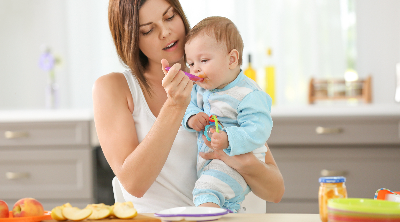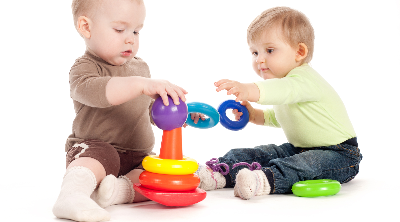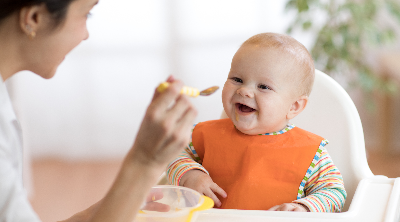
4 - 6 Month Mental and Social Development
In 4-6 months, your baby starts to communicate by using his voice, movements and facial expression. He smiles when you point his toy and expresses that he wants to play with it by shaking his hands, arms and legs. In response to your talks, he may smile, make aguu and chirping sounds. Try to perceive and respond to your baby's signs and messages. As long as you respond to his chirping, your baby understands that you care about what he says and he will be both happy and willing to learn to speak. When he is 3-4 months old, your baby learns to listen while someone is speaking. When a person stops talking, he answers by some voices, then he again keeps silent and waits for the answer. Learning that is an important development.
During these months, your baby starts to live routines, eating and sleeping behaviours become more regular. When you turn off the lights, he understands it's time for him to sleep. You can do the same things at the same time and in the same order, making it easier for him to get used to an order. For example, if you make a sorting before going to bed at night in the same order, such as, first bathing, then reading book, then feeding, and singing lullaby at last, and if you repeat it every evening, your baby will also understand the order and adapt to it easily. When you always sing the same lullaby when it is time to feed, your baby will understand that the next time he hears this lullaby he will be fed soon and he will learn to calm down and to wait.
In these months there are many things you can do to support your baby's development. Listen to what he says and respond to the sounds he makes. You can sing to your baby, talk to her frequently, tell her a tale and read a book together. Explaining the movements you are doing at that time will also support his language development; It's like saying, "now I'm preparing food for you ...". If you observe him, learn to read the signs he gives you, and respond to his feelings, needs and wishes, then life is more pleasant and comfortable for you and your baby. If you understand when he is tired of playing game, you can give a break for the game and let him rest. For example, if he is turning his eyes away from the toy you're playing with, it's likely that he is bored or tired, so it's time to stop playing. If he's rubbing his eyes, he may be sleepy, when you understand that, let him sleep.
Do not Forget:
Do not forget that each child is unique and shows unique growth and developmental characteristics. Not all babies acquire exactly the same developmental characteristics at the same time. Premature infants also show these developments later than babies of the same age group. For this reason, do not compare your infants with his peers but follow baby according to his own development line. If your baby has not shown the expected improvement in these months, please talk to your doctor.







 English
English











